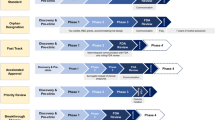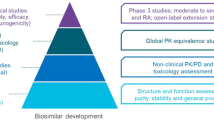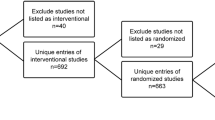Abstract
The US Food and Drug Administration’s decisions about drug approval—though guided by science, as well as relevant statutes, regulations, and guidance documents—reflect normative judgments about how the agency should exercise its discretion. This is particularly true in the context of the “accelerated approval” pathway, where the agency must balance speeding to market drugs for patients with unmet needs before they have been proven to work and ensuring confidence about the benefits and risks of those drugs. A key challenge in evaluating normative judgments such as these is that reasonable people can disagree, rendering it difficult to proclaim with certainty that a particular decision is right or wrong. Therefore, we propose that it is preferable to ask whether a decision is reasonable. A decision is reasonable when it transparently, comprehensively, and fairly balances the interests of affected parties, within the parameters of the decision maker’s legal authority. If a decision achieves these three qualities, it can be viewed as legitimate and worthy of trust and confidence, regardless of whether one agrees with the particular outcome. We recommend that the Food and Drug Administration adopt procedural protections to promote reasonableness in four domains affecting accelerated approval decisions: pathway gatekeeping, endpoint selection, stakeholder engagement, and deliberation. This should aid the agency in minimizing controversies, such as that surrounding the 2021 approval of aducanumab (Aduhelm; Biogen).

Similar content being viewed by others
References
US FDA. Accelerated approval. Published January 4, 2018. https://www.fda.gov/patients/fast-track-breakthrough-therapy-accelerated-approval-priority-review/accelerated-approval. Accessed 8 Dec 2021.
US FDA. Guidance for industry: expedited programs for serious conditions: drugs and biologics. Published May 2014. https://www.fda.gov/files/drugs/published/Expedited-Programs-for-Serious-Conditions-Drugs-and-Biologics.pdf. Accessed 23 Apr 2022.
Grossman LA. Choose your medicine: freedom of therapeutic choice in America. 1st ed. Oxford: Oxford University Press; 2021.
Fernandez Lynch H, Joffe S, McCoy MS. The limits of acceptable political influence over the FDA. Nat Med. 2021;27(2):188–90. https://doi.org/10.1038/s41591-020-01200-w.
Office of the Law Revision Counsel of the United States House of Representatives. Chapter 9. Federal Food, Drug, and Cosmetic Act. 21 USC §356. Expedited approval of drugs for serious or life-threatening diseases or conditions. https://uscode.house.gov/view.xhtml?req=(title:21%20section:356%20edition:prelim.) Accessed 24 Jan 2022.
House Committee on Energy and Commerce. Pallone introduces Bill to improve FDA’s accelerated approval program. Published March 7, 2022. https://energycommerce.house.gov/newsroom/press-releases/pallone-introduces-bill-to-improve-fda-s-accelerated-approval-program. Accessed 22 Apr 2022.
Dunn B, Stein P, Cavazzoni P. Approval of aducanumab for Alzheimer disease: the FDA’s Perspective. JAMA Intern Med. 2021. https://doi.org/10.1001/jamainternmed.2021.4607.
Kesselheim AS. Letter to Janet Woodcock. Published online June 10, 2021. https://pbs.twimg.com/media/E3jKN4GWYAUGj9U.png. Accessed 25 May 2022.
Biogen. Biogen and Eisai to discontinue phase 3 ENGAGE and EMERGE trials of aducanumab in Alzheimer’s disease. Published March 21, 2019. https://investors.biogen.com/news-releases/news-release-details/biogen-and-eisai-discontinue-phase-3-engage-and-emerge-trials. Accessed 7 Oct 2021.
Karlawish J. Aducanumab and the business of Alzheimer disease: some choice. JAMA Neurol. 2021. https://doi.org/10.1001/jamaneurol.2021.3123.
Budd Haeberlein S, Aisen PS, Barkhof F, et al. Two randomized phase 3 studies of aducanumab in early Alzheimer’s disease. J Prev Alzheimers Dis. 2022. https://doi.org/10.14283/jpad.2022.30.
Biogen. Biogen plans regulatory filing for aducanumab in Alzheimer’s disease based on new analysis of larger dataset from phase 3 studies. Published October 22, 2019. https://investors.biogen.com/news-releases/news-release-details/biogen-plans-regulatory-filing-aducanumab-alzheimers-disease. Accessed 8 Dec 2021.
Carroll J. In a stunning turnaround, Biogen says that aducanumab does work for Alzheimer’s—but data mining incites controversy and questions. Endpoints News. Published October 22, 2021. https://endpts.com/in-a-stunning-turnaround-biogen-says-that-aducanumab-does-work-for-alzheimers-and-theyre-prepping-a-pitch-to-the-fda/. Accessed 21 Jul 2021.
Belluck P. F.D.A. Panel declines to endorse controversial Alzheimer’s drug. New York Times. Published November 6, 2020. https://www.nytimes.com/2020/11/06/health/aducanumab-alzheimers-drug-fda-panel.html. Accessed 15 Jul 2021.
Usdin S. Why FDA, Biogen should be unusually transparent with aducanumab data: an editor’s commentary. Published June 2, 20221. https://www.biocentury.com/article/636826/why-fda-biogen-should-be-unusually-transparent-with-aducanumab-data-an-editor-s-commentary. Accessed 6 Jan 2022.
Musiek ES, Holtzman DM. Three dimensions of the amyloid hypothesis: time, space and “wingmen.” Nat Neurosci. 2015;18(6):800–6. https://doi.org/10.1038/nn.4018.
Gingery D. Patient support may have helped push Aduhelm toward approval. Pink Sheet Informa Pharma Intelligence. Published June 7, 2021. https://pink.pharmaintelligence.informa.com/PS144438/Patient-Support-May-Have-Helped-Push-Aduhelm-Toward-Approval. Accessed 16 Jul 2021.
Planche V, Villain N. US Food and Drug Administration approval of aducanumab: is amyloid load a valid surrogate end point for Alzheimer disease clinical trials? JAMA Neurol. 2021;78(11):1307–8. https://doi.org/10.1001/jamaneurol.2021.3126.
Makin S. The amyloid hypothesis on trial. Nature. 2018;559(7715):S4-7. https://doi.org/10.1038/d41586-018-05719-4.
Salloway S, Chalkias S, Barkhof F, et al. Amyloid-related imaging abnormalities in 2 phase 3 studies evaluating aducanumab in patients with early Alzheimer disease. JAMA Neurol. 2021. https://doi.org/10.1001/jamaneurol.2021.4161.
Belluck P. Concerns grow over safety of Aduhelm after death of patient who got the drug. New York Times. Published November 22, 2021. https://www.nytimes.com/2021/11/22/health/aduhelm-death-safety.html. Accessed 26 May 2022.
Liu A. Biogen, Eisai face down another Aduhelm refusal—this time from Japanese regulators. Fierce Pharma. Published December 22, 2021. https://www.fiercepharma.com/pharma-asia/biogen-eisai-hit-second-aduhelm-refusal-days-time-from-japanese-regulators. Accessed 6 Jan 2022.
Beasley D. Biogen pulls application for Alzheimer’s drug in Europe. Reuters. Published April 22, 2022. https://www.reuters.com/business/healthcare-pharmaceuticals/biogen-withdraw-alzheimers-drug-application-europe-2022-04-22/. Accessed 23 Apr 2022.
Chappell B. 3 experts have resigned from an FDA Committee over Alzheimer’s drug approval. NPR. Published June 11, 2021. https://www.npr.org/2021/06/11/1005567149/3-experts-have-resigned-from-an-fda-committee-over-alzheimers-drug-approval. Accessed 7 Dec 2021.
Cavazzoni P, Dunn B, Stein P. Here’s why we approved the first new Alzheimer’s drug in 2 decades. Washington Post. Published June 23, 2021. https://www.washingtonpost.com/opinions/2021/06/23/fda-alzheimers-drug-approval-aducanumab/. Accessed 22 Jul 2021.
Dunn B, Stein P, Temple R, Cavazzoni P. An appropriate use of accelerated approval: aducanumab for Alzheimer’s disease. N Engl J Med. 2021;385:856–7. https://doi.org/10.1056/NEJMc2111960.
Brennan Z. Woodcock defends Biogen’s new Alzheimer’s drug, says it has more supportive data than many past accelerated approvals. Endpoints News. Published June 22, 2021. https://endpts.com/woodcock-defends-biogens-new-alzheimers-drug-says-it-has-more-supportive-data-than-many-past-accelerated-approvals/. Accessed 21 Jul 2021.
Belluck P. Many Alzheimer’s experts say use of Aduhelm should be sharply limited. New York Times. Published June 21, 2021. https://www.nytimes.com/2021/06/21/health/aduhelm-alzheimers-drug.html. Accessed 15 Jul 2021.
Center for Drug Evaluation and Research. Aduhelm label (updated 7.2021). FDA. Published July 8, 2021. https://www.accessdata.fda.gov/drugsatfda_docs/label/2021/761178s003lbl.pdf. Accessed 3 Aug 2021.
VandeVrede L, Gibbs DM, Koestler M, et al. Symptomatic amyloid-related imaging abnormalities in an APOE ε4/ε4 patient treated with aducanumab. Alzheimers Dement (Amst). 2020. https://doi.org/10.1002/dad2.12101.
Cohrs R. The rare tool Medicare might use to pay for Biogen’s new Alzheimer’s drug. STAT. Published July 15, 2021. https://www.statnews.com/2021/07/15/the-ins-and-outs-of-the-rare-controversial-way-medicare-might-pay-for-biogens-new-alzheimers-drug/. Accessed 15 Jul 2021.
Garde D, Feuerstein A. As Aduhelm faces doubts, Biogen plans another pivotal trial for 2022. STAT+. Published December 16, 2021. https://www.statnews.com/2021/12/16/as-aduhelm-faces-doubts-biogen-plans-another-pivotal-trial-for-2022/. Accessed 6 Jan 2022.
Biogen. Biogen submits final protocol for Aduhelm® (aducanumab-avwa) phase 4 ENVISION trial to FDA. Published March 30, 2022. https://investors.biogen.com/news-releases/news-release-details/biogen-submits-final-protocol-aduhelmr-aducanumab-avwa-phase-4. Accessed 22 Apr 2022.
Walker J. Cleveland Clinic, Mount Sinai and Providence won’t give Biogen’s new Alzheimer’s drug. Wall Street Journal. Published July 16, 2021. https://www.wsj.com/articles/cleveland-clinic-mount-sinai-wont-give-biogens-new-alzheimers-drug-11626366968. Accessed 19 Jul 2021.
Walker J. VA health system won’t cover Biogen’s Alzheimer’s drug. Wall Street Journal. Published August 12, 2021. https://www.wsj.com/articles/biogens-alzheimers-drug-wont-be-covered-by-va-health-system-11628803740. Accessed 8 Dec 2021.
Sullivan P. Medicare premiums to jump in part due to pricey Alzheimer’s drug. The Hill. Published November 12, 2021. https://thehill.com/policy/healthcare/581379-medicare-premiums-to-jump-in-part-due-to-pricey-alzheimers-drug. Accessed 6 Jan 2022.
Alonso-Zaldivar R. Alzheimer’s drug cited as Medicare premium jumps by $21.60. AP. Published November 12, 2021. https://apnews.com/article/medicare-health-care-costs-medication-alzheimers-disease-health-27a6250da20a6ba6af4820525c64afc4. Accessed 11 Apr 2022.
Liu A. Biogen halves Aduhelm’s price and plots cost cuts as Medicare decision on controversial Alzheimer’s drug nears. Published December 20, 2021. https://www.fiercepharma.com/pharma/biogen-halves-aduhelm-price-layoffs-ahead-medicare-decision-controversial-alzheimer-s-drug. Accessed 6 Jan 2022.
Institute for Clinical and Economic Review (ICER). ICER publishes final evidence report and policy recommendations on aducanumab for Alzheimer’s disease. Published August 5, 2021. https://icer.org/news-insights/press-releases/icer-publishes-final-evidence-report-and-policy-recommendations-on-aducanumab-for-alzheimers-disease/. Accessed 6 Jan 2022.
Centers for Medicare & Medicaid Services. CMS proposes Medicare coverage policy for monoclonal antibodies directed against amyloid for the treatment of Alzheimer’s disease. Published January 11, 2022. https://www.cms.gov/newsroom/press-releases/cms-proposes-medicare-coverage-policy-monoclonal-antibodies-directed-against-amyloid-treatment. Accessed 24 Jan 2022.
CMS. CMS opens national coverage determination analysis on treatment for Alzheimer’s disease. Published July 12, 2021. https://www.cms.gov/newsroom/press-releases/cms-opens-national-coverage-determination-analysis-treatment-alzheimers-disease. Accessed 6 Jan 2022.
Centers for Medicare & Medicaid Services. CMS finalizes Medicare coverage policy for monoclonal antibodies directed against amyloid for the treatment of Alzheimer’s disease. Published April 7, 2022. https://www.cms.gov/newsroom/press-releases/cms-finalizes-medicare-coverage-policy-monoclonal-antibodies-directed-against-amyloid-treatment. Accessed 11 Apr 2022.
Belluck P. Medicare officially limits coverage of Aduhelm to patients in clinical trials. New York Times. Published April 7, 2022. https://www.nytimes.com/2022/04/07/health/aduhelm-medicare-alzheimers.html. Accessed 11 Apr 2022.
Brennan Z. CMS official on Alzheimer’s drug coverage decision: don’t read between the lines for other accelerated approvals. Endpoints News. Published April 13, 2022. https://endpts.com/cms-official-on-alzheimers-drug-coverage-decision-dont-read-between-the-lines-for-other-accelerated-approvals/. Accessed 23 Apr 2022.
2020 Alzheimer’s disease facts and figures. Alzheimers Dement. 2020;16(3):391–460. https://doi.org/10.1002/alz.12068
Pike J. Letter to the Peripheral and Central Nervous System Drugs Advisory Committee. Published online October 23, 2020. https://www.alz.org/email/_internal/downloads/AA-FDA-102320.pdf. Accessed 8 Dec 2021.
Feuerstein A, Herper M, Garde D. Inside ‘Project Onyx’: how Biogen used an FDA back channel to win approval of its polarizing Alzheimer’s drug. STAT+. Published June 29, 2021. https://www.statnews.com/2021/06/29/biogen-fda-alzheimers-drug-approval-aduhelm-project-onyx/. Accessed 8 Dec 2021.
HHS Office of the Inspector General. Review of the FDA’s accelerated approval pathway. Published 2021. https://oig.hhs.gov/reports-and-publications/workplan/summary/wp-summary-0000608.asp. Accessed 8 Dec 2021.
Belluck P. House Committees demand F.D.A. records on Alzheimer’s drug approval. New York Times. Published September 2, 2021. https://www.nytimes.com/2021/09/02/health/aduhelm-fda.html. Accessed 29 Sep 2021.
Silverman E, Cohrs R, Florko N. The biggest losers from Medicare’s decision on Aduhelm may be Biogen’s competitors. STAT+. Published January 12, 2022. https://www.statnews.com/pharmalot/2022/01/12/biggest-losers-biogen-competitors-medicare-aduhelm/. Accessed 24 Jan 2022.
Gyawali B, Hey SP, Kesselheim AS. Assessment of the clinical benefit of cancer drugs receiving accelerated approval. JAMA Intern Med. 2019;179(7):906–13. https://doi.org/10.1001/jamainternmed.2019.0462.
Begley S. The maddening saga of how an Alzheimer’s ‘cabal’ thwarted progress toward a cure for decades. STAT. Published June 25, 2019. https://www.statnews.com/2019/06/25/alzheimers-cabal-thwarted-progress-toward-cure/. Accessed 6 Jan 2022.
Feuerstein A. Biogen, Eisai seek fast approval for second Alzheimer’s drug, relying on relaxed FDA standard. STAT. Published September 28, 2021. https://www.statnews.com/2021/09/28/biogen-eisai-seek-fast-approval-for-second-alzheimers-drug-relying-on-relaxed-fda-standard/. Accessed 8 Dec 2021.
Loftus P. Eli Lilly asks FDA to approve Alzheimer’s drug. Wall Street Journal. Published October 26, 2021. https://www.wsj.com/articles/eli-lilly-asks-fda-to-approve-alzheimers-drug-11635262324. Accessed 8 Dec 2021.
Gardner J. Lilly slows FDA submission of Alzheimer’s drug after Medicare decision. BiopharmaDive. Published February 3, 2022. https://www.biopharmadive.com/news/eli-lilly-fda-donanemab-slow-submission-alzheimers/618258/. Accessed 1 Apr 2022.
Balas C. FDA should lead the way on new ALS treatments, not Canada and Europe. STAT. Published June 22, 2021. https://www.statnews.com/2021/06/22/canada-europe-shouldnt-lead-way-new-als-treatments/. Accessed 25 May 2022.
Milligan E, McCurdy KR. Aduhelm backlash threatens to reverse progress in FDA’s reviews of rare and ultra-rare disease drugs. STAT. Published September 14, 2021. https://www.statnews.com/2021/09/14/aduhelm-backlash-may-imperil-fda-reviews-ultra-rare-disease-drugs/. Accessed 8 Dec 2021.
Zipprich B. Will the shadow of Aduhelm cloud FDA’s decision-making on an ALS therapy? STAT. Published April 21, 2022. https://www.statnews.com/2022/04/21/aduhelm-shadow-cloud-fda-amx0035-decision/. Accessed 22 Apr 2022.
2021 Alzheimer’s disease facts and figures. Alzheimers Dement. 2021;17(3):327–406. https://doi.org/10.1002/alz.12328
Sachs RE, Bagley N. Medicare coverage of aducanumab: implications for state budgets. N Engl J Med. 2021;385(22):2019–21. https://doi.org/10.1056/NEJMp2115297.
DiMagno SSP, Glickman A, Emanuel EJ. Accelerated approval of cancer drugs-righting the ship of the US Food and Drug Administration. JAMA Intern Med. 2019;179(7):922–3. https://doi.org/10.1001/jamainternmed.2019.0584.
Bagley N, Sachs R. The drug that could break American health care. The Atlantic. Published June 11, 2021. https://www.theatlantic.com/ideas/archive/2021/06/aduhelm-drug-alzheimers-cost-medicare/619169/. Accessed 6 Jan 2022.
FDA. Expedited programs for serious conditions: drugs and biologics. Published May 2014. https://www.fda.gov/regulatory-information/search-fda-guidance-documents/expedited-programs-serious-conditions-drugs-and-biologics. Accessed 6 Jan 2022.
Lynch HF, Robertson CT. Challenges in confirming drug effectiveness after early approval. Science. 2021;374(6572):1205–7. https://doi.org/10.1126/science.abk3495.
Beaver JA, Howie LJ, Pelosof L, et al. A 25-year experience of US Food and Drug Administration accelerated approval of malignant hematology and oncology drugs and biologics: a review. JAMA Oncol. 2018;4(6):849. https://doi.org/10.1001/jamaoncol.2017.5618.
US FDA. FDA seeks $8.4 billion to further investments in critical public health modernization, core food and medical product safety programs. Published March 28, 2022. ews-events/press-announcements/fda-seeks-84-billion-further-investments-critical-public-health-modernization-core-food-and-medical. Accessed 23 Apr 2022.
Mehta GU, de Claro RA, Pazdur R. Accelerated approval is not conditional approval: insights from international expedited approval programs. JAMA Oncol. 2022. https://doi.org/10.1001/jamaoncol.2021.6854.
Kaltenboeck A, Mehlman A, Pearson SD. Strengthening the accelerated approval pathway: an analysis of policy reforms and their impact on uncertainty, access, innovation, and costs. 2021. https://icer.org/wp-content/uploads/2021/04/Strengthening-the-Accelerated-Approval-Pathway-_-ICER-White-Paper-_-April-2021.pdf. Accessed 8 Dec 2021.
Taylor RS, Elston J. The use of surrogate outcomes in model-based cost-effectiveness analyses: a survey of UK Health Technology Assessment reports. Health Technol Assess. 2009;13(8):1–50. https://doi.org/10.3310/hta13080.
Dawoud D, Naci H, Ciani O, Bujkiewicz S. Raising the bar for using surrogate endpoints in drug regulation and health technology assessment. BMJ. 2021;374: n2191. https://doi.org/10.1136/bmj.n2191.
Edwards KT. Good and bad patient involvement: implementing the patient-involvement provisions of the 21st Century Cures Act at the FDA. Yale Law Journal. 2018;128. https://www.yalelawjournal.org/forum/good-and-bad-patient-involvement. Accessed 22 Apr 2022.
McCoy MS, Warsh J, Rand L, Parker M, Sheehan M. Patient and public involvement: two sides of the same coin or different coins altogether? Bioethics. 2019;33(6):708–15. https://doi.org/10.1111/bioe.12584.
Largent EA, Peterson A, Lynch HF. FDA drug approval and the ethics of desperation. JAMA Intern Med. 2021;181(12):1555–6. https://doi.org/10.1001/jamainternmed.2021.6045.
Halley MC. From “ought” to “is”: surfacing values in patient and family advocacy in rare diseases. Am J Bioeth. 2021;21(12):1–3. https://doi.org/10.1080/15265161.2021.1996801.
Florko N. Califf admits controversy over FDA’s Alzheimer’s drug decision impacted experts’ trust in the agency. Published March 31, 2022. https://www.statnews.com/2022/03/31/califf-fda-alzheimers-drug-impacted-expert-trust/. Accessed 4 Apr 2022.
Lynch HF, Zettler PJ, Sarpatwari A. Promoting patient interests in implementing the Federal Right to Try Act. JAMA. 2018;320(9):869. https://doi.org/10.1001/jama.2018.9880.
McCoy MS, Emanuel EJ. Why there are no “potential” conflicts of interest. JAMA. 2017;317(17):1721–2. https://doi.org/10.1001/jama.2017.2308.
McCoy MS, Carniol M, Chockley K, Urwin JW, Emanuel EJ, Schmidt H. Conflicts of interest for patient-advocacy organizations. N Engl J Med. 2017;376(9):880–5. https://doi.org/10.1056/NEJMsr1610625.
Rose SL. Patient advocacy organizations: institutional conflicts of interest, trust, and trustworthiness. J Law Med Ethics. 2013;41(3):680–7. https://doi.org/10.1111/jlme.12078.
Janiaud P, Irony T, Russek-Cohen E, Goodman SNUS. Food and Drug Administration reasoning in approval decisions when efficacy evidence Is borderline, 2013–2018. Ann Intern Med. 2021;174(11):1603–11. https://doi.org/10.7326/M21-2918.
Author information
Authors and Affiliations
Corresponding author
Ethics declarations
Funding
EL is supported by the National Institute on Aging (K01-AG064123) and the Greenwall Faculty Scholars Program. AP is funded by R21AG069805 and the Greenwall Faculty Scholars Program. JK is supported by the National Institute on Aging (P30-AG-072979). HFL is supported by the Greenwall Faculty Scholars Program. No funding was received specifically for the publication of this article.
Conflict of interest
EL has no conflicts of interest or competing interests to report. AP has no conflicts of interest or competing interests to report. JK is a site investigator for clinical trials sponsored by Lilly and Biogen. HFL has no conflicts of interest or competing interests to report.
Ethics approval
Not applicable.
Consent to participate
Not applicable.
Consent for publication
Not applicable.
Availability of data and material
Not applicable.
Code availability
Not applicable.
Authors’ contributions
EL, AP, JK, and HFL contributed to the formulation of the idea for the article; EL wrote the first draft of the article; and EL, AP, JK, and HFL critically revised the work. All authors read and approved the final submitted manuscript and agreed to be accountable for the work.
Rights and permissions
About this article
Cite this article
Largent, E.A., Peterson, A., Karlawish, J. et al. Aspiring to Reasonableness in Accelerated Approval: Anticipating and Avoiding the Next Aducanumab. Drugs Aging 39, 389–400 (2022). https://doi.org/10.1007/s40266-022-00949-8
Accepted:
Published:
Issue Date:
DOI: https://doi.org/10.1007/s40266-022-00949-8




